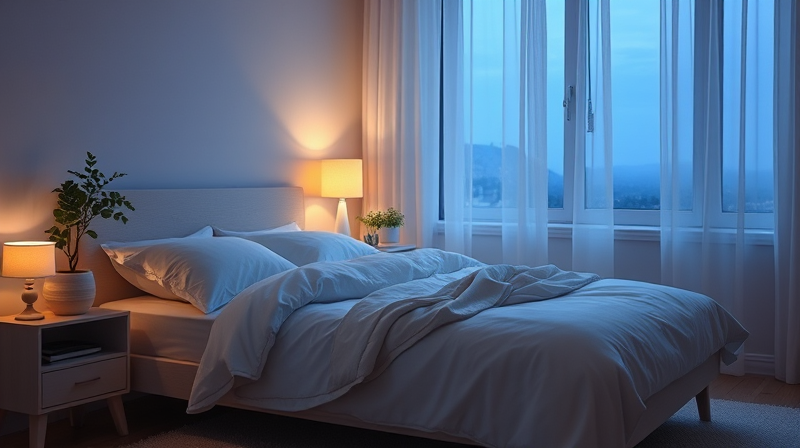Quality sleep is a fundamental cornerstone of a healthy lifestyle. In today’s fast-paced world, the quest for natural sleep improvement has become essential for mental and physical well-being. This article provides a detailed exploration of proven, evidence-based strategies that help you secure a deep and restorative sleep without relying on artificial aids.
By incorporating these practices into your daily routine, you not only enhance the natural production of sleep hormones but also cultivate habits that bolster your resilience against stress and fatigue. The journey begins with small, consistent changes that gradually shift your sleep patterns into a state of natural equilibrium.
Establish a Consistent Sleep Schedule
One of the first steps to naturally enhancing your sleep quality is to establish a consistent sleep schedule. Your body thrives on routine, and going to bed and waking up at the same time every day can regulate your internal clock, allowing you to experience deeper and more restorative sleep over time.
Even on weekends, try to keep your sleep cycle aligned. The cumulative effect of this consistency helps your body anticipate rest and can significantly reduce insomnia problems.
Create an Optimal Sleep Environment
Your sleep environment plays a crucial role in ensuring your sleep is both productive and restorative. It is important to design your bedroom with sleep-promoting elements that contribute to optimal rest.
- Cool Temperature: Keep your room at around 65°F or 18°C. A cooler room helps signal your body that it’s time to wind down.
- Darkness: Invest in blackout curtains or use an eye mask to make your room as dark as possible, minimizing disruptive light exposure.
- Quietude: Whether by using earplugs or a white noise machine, reducing ambient noise can aid in a smoother descent into sleep.
- Comfort: A comfortable mattress and supportive pillows are essential investments that contribute to quality sleep by providing the right level of comfort and support.
Designing a bedroom that caters explicitly to sleep can create a sanctuary free from the distractions of daily life, making it easier for your mind and body to transition naturally into sleep mode.
Develop a Relaxing Bedtime Routine
Embracing a calming pre-sleep ritual is one of the most effective ways to prepare your mind and body for sleep. Establishing this ritual creates a mental association between your bedroom and a state of relaxation and serenity.
You might consider taking a warm bath 1-2 hours before bed, which not only soothes tired muscles but also helps regulate your body temperature for a smoother transition into sleep.
Other activities include deep breathing exercises, meditation, gentle stretching, reading a calming book, or listening to soft, soothing music. These practices help to diminish the buildup of daily stress and equip your body to slide effortlessly into a restful state.
Manage Light Exposure
Light plays an influential role in managing your circadian rhythm. Exposure to natural sunlight during the day helps reinforce your body’s internal clock, which in turn enhances your overall alertness during the day and helps you feel sleepy at an appropriate time in the evening.
Additionally, consider implementing a digital sunset. Avoiding blue light emitted by electronic devices 1-2 hours before bedtime can minimize disruptions to your sleep cycle. Reducing screen time during the pre-sleep window is essential in ensuring your natural sleep cues are not compromised.
Watch Your Diet and Exercise
Your dietary habits and physical activity levels have a profound impact on your sleep quality. To enhance your sleep naturally, it is advisable to avoid heavy meals, caffeine, and alcohol close to bedtime.
Regular exercise is beneficial, but the timing matters. Exercising too close to your bedtime can be stimulating rather than relaxing. Aim to complete vigorous workouts at least 3-4 hours before going to sleep.
If you feel a bit hungry as bedtime approaches, opt for a light, nutritious snack that promotes the release of sleep-friendly hormones.
Address Sleep Disruptors
Sleep can be disrupted by factors that are often overlooked, such as uncontrolled daytime napping or stressful mental activities before bed. It's best to limit naps to a brief 20 minutes and avoid them after mid-afternoon.
If you find yourself struggling to fall asleep within 20 minutes of lying down, consider engaging in a quiet, soothing activity until you feel sleepier. This practice prevents the buildup of frustration, which itself can be a significant sleep disruptor.
For those battling persistent sleep issues, the exploration of cognitive behavioral therapy for insomnia (CBT-I) might be beneficial. This structured approach can help reframe negative thoughts and behaviors around sleep, creating more favorable conditions for natural sleep patterns.
Optimize Your Sleep-Wake Cycle and Leverage Technology Wisely
Fine-tuning your sleep cycles can also make a significant difference in how rested you feel upon waking. Observing the 90-minute sleep cycle rule, where you try to wake up at the end of a complete sleep cycle, can help you rise more alert and refreshed.
Moreover, simple breathing techniques like the 4-7-8 method—inhaling for 4 seconds, holding your breath for 7 seconds, and exhaling for 8 seconds—can effectively calm the mind and body as bedtime approaches.
While it is advisable to avoid screens before sleep, smart technology can be a helpful ally. Sleep-tracking apps and devices remind you of patterns and disruptions that you might not otherwise be aware of, offering valuable insights that can be used to fine-tune your sleep habits.
In conclusion, embracing a natural approach to sleep involves adopting consistent habits that reinforce your body’s innate ability to rest and rejuvenate. By establishing reliable routines, optimizing your sleep environment, and managing lifestyle choices, you can significantly enhance your sleep quality without the need for artificial aids. Each of these strategies is designed to work in harmony with your body’s natural rhythms, ensuring that your sleep is as restorative as possible.
The journey to better sleep is as much about patience and persistence as it is about making the right choices. Over time, these small changes can lead to profound improvements in your overall health, well-being, and daily performance. If challenges persist, seeking advice from healthcare professionals can provide additional personalized strategies to help repair and perfect your sleep routine.








